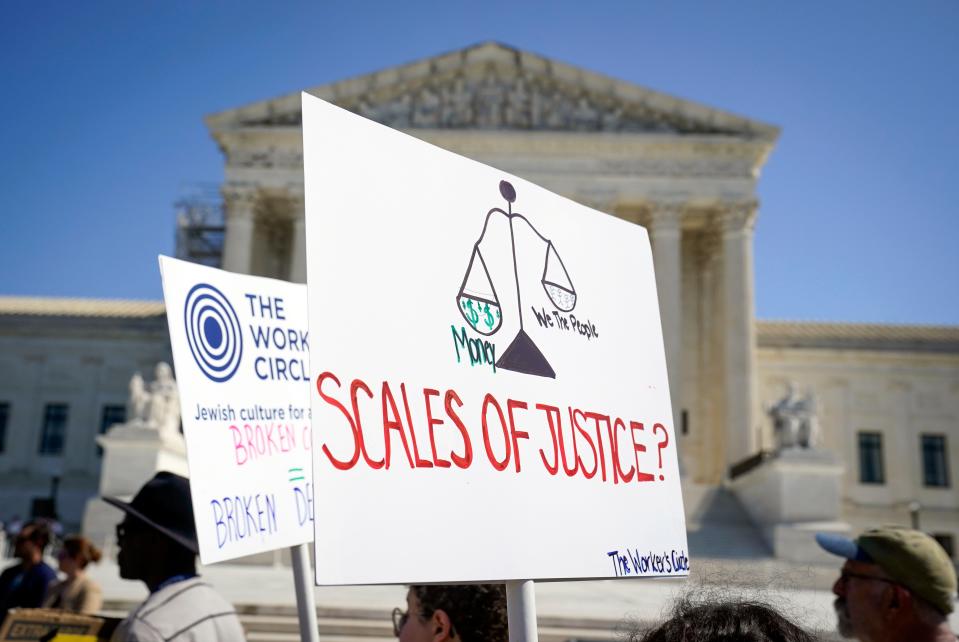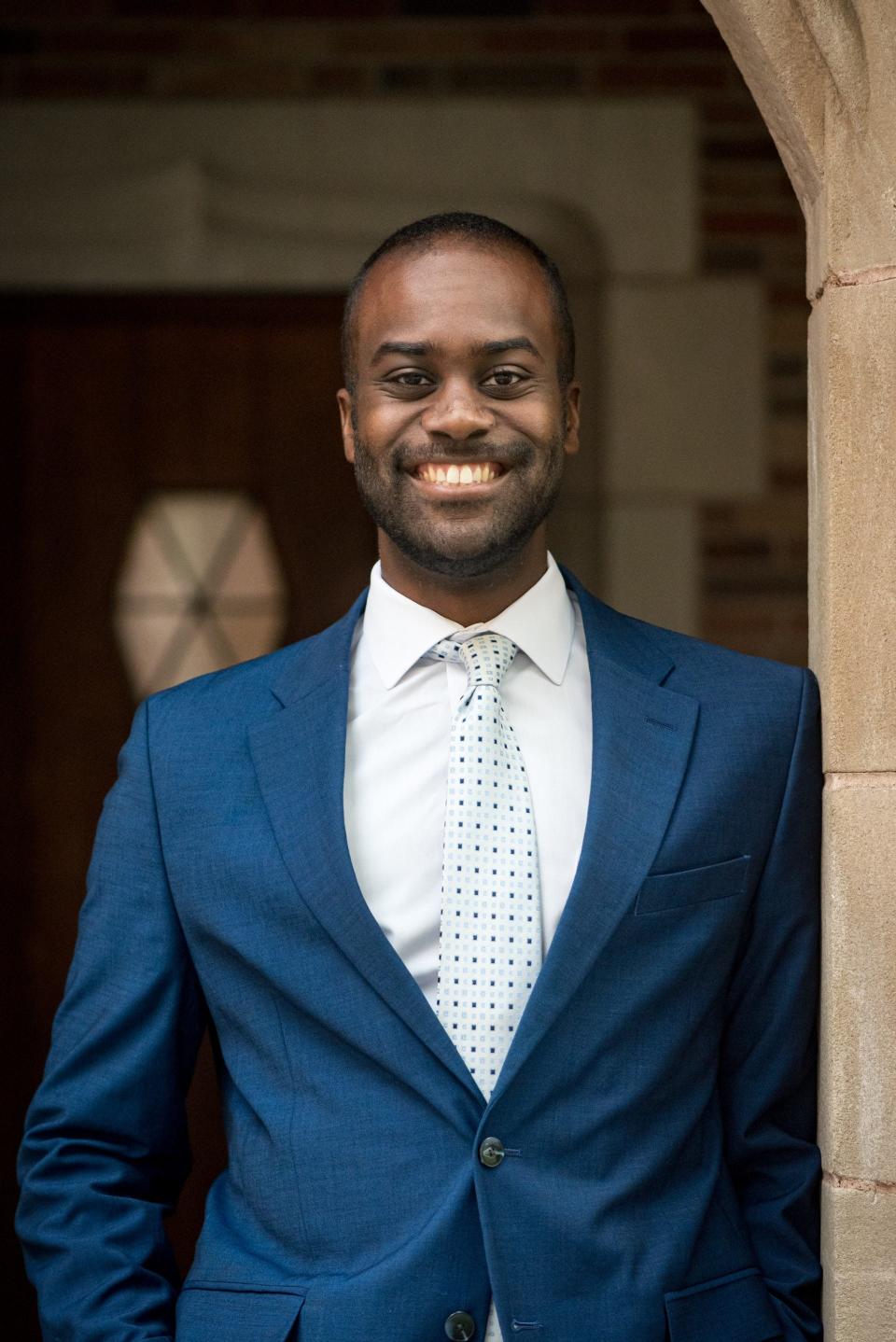Are law students like me too late to help save our democracy? No, history reminds me why.
As a first-year law student, I have learned a great deal about the Constitution over the past several months. Along with my classmates, I have grappled with weighty legal questions and read the Supreme Court decisions that sought to answer them.
Meanwhile, I have been paying attention to the state of the law in our country. Confidence in the Supreme Court is abysmally low following decisions that many argue have restricted basic rights and freedoms. A defeated former president faces 91 criminal charges and is not only running a third time but also holds a commanding lead in the Republican primary. Not long ago, that same former president called for the Constitution to be suspended and for the results of the 2020 election to be overturned. It feels as if the rule of law – and our very democracy – are hanging on by a thread.
These circumstances serve as the backdrop for my legal education. My classmates and I came to law school to gain the tools necessary to effect change within our nation's hallowed institutions. But at this chaotic moment in constitutional history in the making, we are left to wonder whether we are too late.
History suggests that we are not too late. In fact, some of our nation’s darkest moments have allowed courageous lawyers to light a path toward a stronger, fairer and more just republic.

Overturning Dred Scott v. Sandford with 'citizenship clause'
One example is the Supreme Court’s decision in the 1857 case of Dred Scott v. Sandford. There, the justices held 7-2 that Black people “are not included, and were not intended to be included, under the word 'citizens’ in the Constitution.”
Blowback to the decision was swift. Anti-slavery advocates saw the decision for what it was: in the words of Frederick Douglass, an “open, glaring, and scandalous tissue of lies.” Those lies threw the nation into further chaos, deepening the divide between the North and South that led to Civil War four years later.
Black history is American history. We must face facts, face fears and face forward.
At that time of constitutional crisis, it would have seemed that the Black citizenship question had been woefully settled. But after the Civil War, the opportunity arose for our nation to change its answer. And in 1866, a lawyer named Jacob Howard made sure we seized it.
As a member of Congress’ Joint Committee on Reconstruction, Howard introduced what is now known as the “citizenship clause” of the 14th Amendment, which explicitly defined as citizens “all persons born or naturalized in the United States, and subject to the jurisdiction thereof.”
Once the amendment was ratified, the citizenship clause reversed the Dred Scottdecision and secured citizenship for all formerly enslaved people. Howard rewrote the law and helped right one of the Supreme Court’s most egregious wrongs.
Opinion alerts: Get columns from your favorite columnists + expert analysis on top issues, delivered straight to your device through the USA TODAY app. Don't have the app? Download it for free from your app store.
Fighting racial as well as gender discrimination
While the very next sentence of the 14th Amendment promises that “no State shall make or enforce any law which shall abridge the privileges or immunities of citizens of the United States,” the Supreme Court nevertheless held in the 1873 case of Bradwell v. Illinois that a woman’s right to practice her profession was not covered.
Citing “the law of the Creator,” the court declared that “the paramount destiny and mission of woman are to fulfill the noble and benign offices of wife and mother.”
With Bradwell, the justices sank a knife into the heart of the women’s rights movement. Even after the ensuing decades saw a series of major victories, courts still did not view laws that discriminated against women as constitutionally suspect.
Reproductive rights still at risk: It's 2023, but a woman and her doctor must ask a judge’s permission to get an abortion in Texas
That ultimately changed thanks to two brilliant and determined lawyers.
The first, Pauli Murray, was a leader in both the civil rights and women’s rights movements. After laying the intellectual groundwork for the arguments Thurgood Marshall used to dismantle “separate but equal” in Brown v. Board of Education,Murray developed a legal strategy based on the notion that courts should view race and gender on the same constitutional plane. And in the 1971 case of Reed v. Reed, the second lawyer executed that strategy.
That lawyer – then a young professor – volunteered to write a legal brief challenging a blatantly gender discriminatory Idaho law. She based her argument on Murray’s, even listing her as a co-author. Thankfully, their argument prevailed as the Supreme Court finally ruled that gender discrimination – like racial discrimination – violated the 14th Amendment.
And 22 years later, that young professor became Justice Ruth Bader Ginsburg.

Although I have only scratched the surface of my legal education, learning this history at this moment reminds me why I came to law school. The present assaults on voting rights, abortion rights, affirmative action and the rule of law call for a new generation of lawyers to do what brave lawyers throughout history have done:
Believe in the power of the Constitution, and channel that power to perfect our imperfect union.
Gevin Reynolds is a contributor to The Root and a first-year law student at Yale Law School, where he serves as an editor of the Yale Journal on Regulation.
You can read diverse opinions from our Board of Contributors and other writers on the Opinion front page, on Twitter @usatodayopinion and in our daily Opinion newsletter.
This article originally appeared on USA TODAY: Trump, low confidence in Supreme Court remind me why I'm studying law

